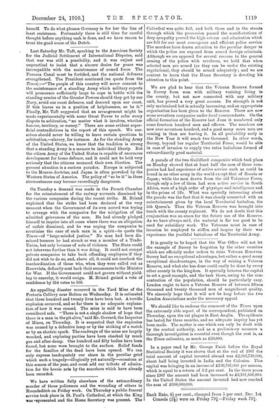Last Saturday Mr. Taft, speaking to the American Society for
the Judicial Settlement of International Disputes, said that war was still a possibility, and it was unjust and unpractical to insist that a sincere desire for peace was incompatible with the maintenance of armed force. The Panama Canal must be fortified, and the national defences strengthened. The President continued (we quote from the Times) :—" The people of this country will never consent to the maintenance of a standing Army which military experts will pronounce sufficiently large to cope in battle with the standing armies of the Greater Powers should they get by our Navy, avoid our coast defences, and descend upon our coast. If this leaves us in a position of helplessness, so be it." Finally, Mr. Taft suggested that an arrangement might be made experimentally with some Great Power to refer every dispute to arbitration, "no matter what it involves, whether honour, territory, or money." There are some evident super- ficial contradictions in the report of this speech. We our- selves should never be willing to leave certain questions to arbitration,—slavery, for instance. As for the standing Army of the United States, we know that the tradition is strong that a standing Army is a menace to individual liberty. But the citizen Army of the United States is capable of enormous development for home defence, and it could not be held very seriously that the citizens menaced their own liberties. The present situation is a curious paradox. Europe is subjected to the Monroe doctrine, and Japan is often provoked by the Western States of America. The policy of "so be it " in these circumstances may become exceedingly dangerous.






































 Previous page
Previous page